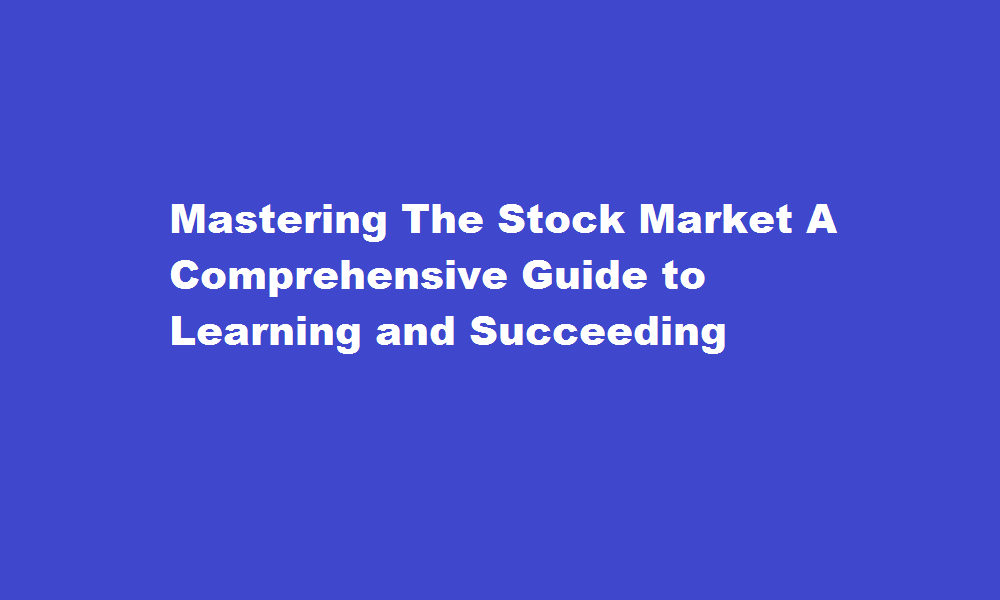Mastering The Stock Market A Comprehensive Guide to Learning and Succeeding
3 min read
Introduction
The stock market can seem complex and intimidating to beginners. However, with the right approach and knowledge, anyone can learn to navigate this dynamic world and potentially benefit from its opportunities. In this article, we will provide you with a step-by-step guide on how to learn the stock market effectively. By following these strategies and tips, you can develop a solid foundation and increase your chances of success in the stock market.
Understanding the Basics
Before diving into the stock market, it’s crucial to grasp the fundamental concepts. Begin by familiarizing yourself with terms like stocks, bonds, mutual funds, and indexes. Understand the relationship between risk and return, and learn about various investment vehicles. Online resources, books, and tutorials are excellent sources to learn the basics. Additionally, consider enrolling in a beginner’s course or attending workshops to gain a structured understanding of the stock market.
Setting Clear Goals
Once you have a foundational understanding, set clear and realistic goals. Determine your investment horizon, risk tolerance, and financial objectives. Are you investing for long-term growth or short-term gains? Defining your goals will help you choose the right investment strategy and assets that align with your aspirations.
Developing a Strategy
Building a well-thought-out strategy is essential for success in the stock market. Consider different investment approaches, such as value investing or growth investing, and identify the one that suits your style. Decide whether you want to invest in individual stocks or opt for diversified portfolios like mutual funds or exchange-traded funds (ETFs). Remember, diversification is key to managing risk effectively.
Studying and Analyzing
To make informed investment decisions, develop strong research skills. Study company financial statements, industry trends, and macroeconomic factors. Analyze stock charts and study technical indicators. Stay updated with market news and events that may impact the companies you’re interested in. Utilize both fundamental analysis and technical analysis to make well-informed investment choices.
Practicing with Simulated Trading
Simulated trading platforms, often referred to as paper trading, allow you to practice investing without risking real money. These platforms provide real-time market data and allow you to execute trades as if you were using actual capital. This practice can help you gain confidence, refine your strategy, and understand the dynamics of the stock market before committing your hard-earned money.
Learning from Experts
Engaging with experienced investors and industry experts can significantly accelerate your learning. Attend investment conferences, join online forums, and participate in stock market communities. Networking with like-minded individuals will expose you to different perspectives and strategies. Additionally, consider finding a mentor who can provide guidance and share their wisdom from years of experience in the stock market.
Continual Learning and Adaptation
The stock market is constantly evolving, so staying up-to-date is crucial. Read books, follow financial blogs, and subscribe to reputable financial news outlets. Take advantage of educational resources provided by brokerage firms and investment websites. Regularly evaluate and adjust your investment strategy based on market conditions, economic trends, and changes in your financial situation.
FREQUENTLY ASKED QUESTIONS
What is a good P E ratio?
Typically, the average P/E ratio is around 20 to 25. Anything below that would be considered a good price-to-earnings ratio, whereas anything above that would be a worse P/E ratio.
Which PB ratio is good?
The price-to-book ratio is used by value investors to identify potential investments. P/B ratios under 1.0 are typically considered solid investments by value investors.
Conclusion
Learning the stock market is a journey that requires patience, dedication, and a thirst for knowledge. By understanding the basics, setting clear goals, developing a strategy, studying and analyzing, practicing with simulated trading, learning from experts, and continually adapting, you can increase your chances of success. Remember, investing in the stock market involves risks, so always conduct thorough research and seek professional advice when needed. Happy investing!
Read Also : A Comprehensive Guide How To Link JavaScript To HTML and CSS






